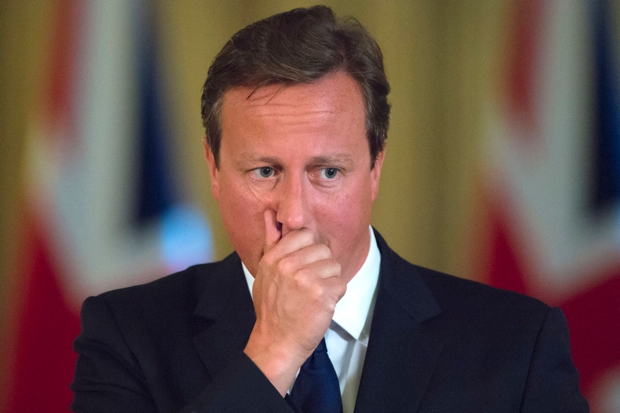As Fraser points out, David Cameron has gone from saying the deficit has been brought down by a third to claiming it has been halved, but with the often unspoken caveat that this is as a share of GDP. After the Prime Minister dropped this claim into his speech today without that very important small print, journalists grilled his official spokesman on whether Cameron was misleading voters at the afternoon lobby briefing. I’ve written up the transcript of our attempts to ask the same question many different ways.
Journalist: When the Prime Minister said in his speech this afternoon the government had halved the deficit, did he qualify that in any way?
Spokesman: How do you mean?
Journalist: In the sense that the deficit in cash terms has not halved, not even nearly halved, it’s thirded.
Spokesman:I think it’s fallen half as a percentage of GDP, hasn’t it?
Journalist: Yes, but he didn’t say halved as a percentage of GDP.
Spokesman:Well, it has halved as a percentage of GDP, which is why the Prime Minister was saying what he said.
Journalist: Why has the government switched from talking about the deficit using one set of metrics to talking about it using another? So previously Osborne wasn’t talking about it as a share of GDP, but now that you want to say that you’ve made progress on it, when actually you’ve still only thirded it, you’re now saying you’ve halved it using it as a share of GDP. Why have you switched?
Spokesman:Well, um, we haven’t. Those numbers will be in the Budget and Autumn Statement.
Journalist: But the numbers will be but the way you’re expressing it has changed so the way Cameron is expressing it today is different to the way that Osborne has previously expressed it before the Autumn Statement.
Spokesman: I said that the numbers that have been published by the OBR and by the government just in the Autumn Statement, people have been poring over them, the numbers will be there, so, er, as a percentage of GDP, it’s halved. That’s the point he was making. I dispute the premise.
Journalist: When the government said that they had reduced it by a third previously was that as a percentage of GDP as well?
Spokesman: Well, I’ll let you go back into the history books.
Journalist: It would be helpful if you could just tell me now.
Let me ask it in another way now. Is it the same number, is it the same amount? Are we talking about the same thing?
Spokesman: Look, the point is that at the Autumn Statement the government was able to set out further progress in reducing the deficit, and the Prime Minister was talking about that and it has halved as a percentage of GDP.
Journalist: But it’s not true that the deficit has been halved not as a share of GDP.
Spokesman: It is true that it has halved as a percentage of GDP. So that’s why the Prime Minister said what he said today.
Journalist: But that’s not what the Prime Minister said. The Prime Minister just said we’ve halved the deficit.
Spokesman: That’s what when you open up the tables and look, as a percentage of GDP it’s halved. So that’s exactly what’s happened. I’m afraid we’re going to continue to disagree on the premises here, but I’m very happy to keep disagreeing.
Journalist: Does the Prime Minister accept the deficit in 2013/14 was £98bn?
Spokesman: The numbers will be set out by the… one of the reforms that this government brought in… was of course an independent Office for Budget Responsibility and, er, well the figures are the ones the Office for Budget Responsibility will have set out.
Journalist: And he also accepts that’s about a 35% reduction?
Spokesman: The numbers set out show exactly the point the Prime Minister was making.
Journalist: Why did the Prime Minister say at the start of December we’ve got the deficit down by a third and then a few days later the Chancellor say we’ve halved it?
Spokesman: Well, I think one was before the Autumn Statement, one was after.
If you’re not confused, you haven’t been paying attention.







Comments